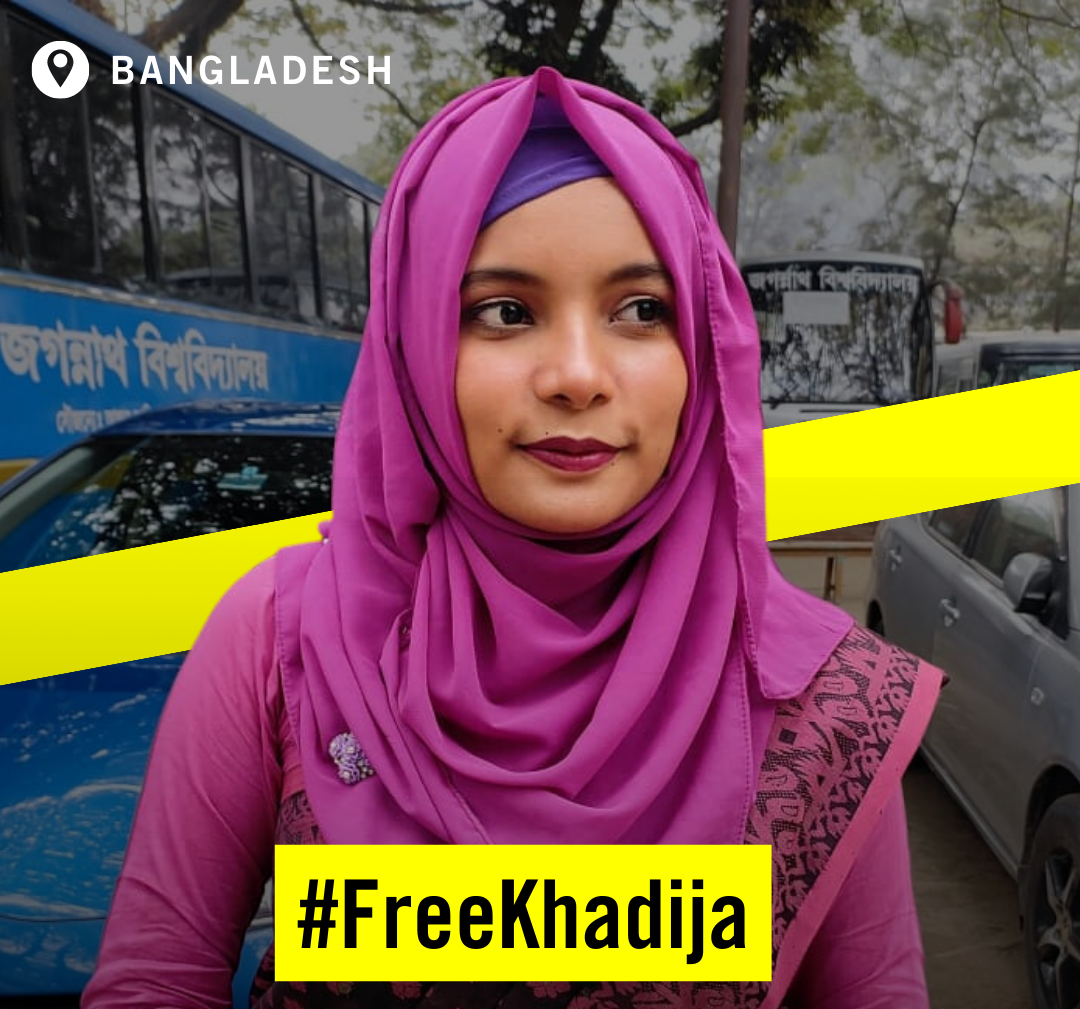Khadijatul Kubra was a 17-year-old meritorious student at Jagannath University in Dhaka, Bangladesh, when she hosted a webinar from an online talk show called “Humanity for Bangladesh”. A guest speaker, formerly a Bangladeshi army official now based in Canada, criticized the government during the webinar. As a result, Khadija and the guest speaker were prosecuted under the Digital Security Act (DSA). Khadija was arrested on August 27, 2022 and has been held without charges, despite her medical conditions. Khadija must be released immediately.
Here’s what you can do:
Write to the Prime Minister of Bangladesh urging his government to:
- Drop the case against Khadijatul Kubra and immediately and unconditionally release her;
- Release all those charged and detained under the DSA solely for exercising their right to freedom of expression;
- Ensure that Khadija receives compensation for the harm caused to her by the arbitrary deprivation of her liberty for one year;
- Pending her release, ensure that she has regular access to adequate healthcare and is held in conditions that meet international standards.
Write to:
Prime Minister Sheikh Hasina
Prime Minister’s Office
Old Sangsad Bhaban
Tejgaon, Dhaka-1215
Bangladesh
Email: ps1topm@pmo.gov.bd
Salutation: Honorable Prime Minister Sheikh Hasina,
And copy:
His Excellency Dr Khalilur RAHMAN
High Commissioner
High Commission for the People’s Republic of Bangladesh
350 Sparks Street,, Suite 1100
Ottawa, ON K1R 7S8
Tel: (613) 236-0138 / 236-0139 Fax: (613) 567-3213
Email: mission.ottawa@mofa.gov.bd
Background
The two cases that were filed against Khadijatul Kubra were almost identical in language, and filed days apart, on October 11 and 19, 2020 by two different police officers at separate police stations, who watched her webinar being live streamed on YouTube. They accused Khadija of “trying to cloud the existing political situation“, “involve the general public in anti-government activities”, “impact the reputation of Bangladesh in the international world”, “bring down the legitimate government of Bangladesh” and were “insulting the Prime Minister, government agencies, and important people of the state”.
According to Khadija’s family, she was aware of the cases against her for several months after they were filed but did not share that information with the family. Her father working as a household staff member in Kuwait and being debt-ridden since the Covid-19 pandemic, Khadija knew her family cannot afford the high expenses and fines those accused under the DSA have to incur. Her parents only learnt of the cases filed against her when the police turned up at their doorstep to arrest their daughter.
Her bail applications were rejected by Dhaka courts several times. On Feb 16, 2023, the High Court granted bail for Khadija, but the bail was stayed due to an appeal by the state. On July 10, the Appellate Division of the Supreme Court adjourned her bail hearing for four months, stating she should be able to take responsibility for the views expressed on her talk show.
Charging minors as adults
Khadija is not the only minor subjected to the Digital Security Act and charged as an adult. Dipti Rani Das, a 17-year-old girl from the Hindu minority in Bangladesh, who was arrested on October 28, 2020, was held at a correctional facility for more than a year for “hurting religious sentiment” and “advancing to deteriorate law and order”. She was granted bail on February 17, 2022 and released from detention on March 15, 2022.
Poritosh Sarkar, a Hindu boy, was accused of “hurting the religious sentiments” of Muslims through a derogatory social media post, when he was a 10th grader. Poritosh was arrested and kept in solitary confinement for eight months, before he was eventually sentenced to five years in prison, despite a lack of conclusive evidence following his investigation.
Mohammed Emon, a 15-year-old high school student, charged under the DSA, spent 16 days in juvenile correctional facility in Gazipur, Bangladesh, prior to being released on bail and consequently had to appear at the court almost every month to register his attendance, after he shared a Facebook post critical of one of Bangladesh’s political leaders.
Violation of right to freedom of expression
On August 7, 2023, the government of Bangladesh announced that the Digital Security Act will be repealed and an alternate Act, Cyber Security Act, will be introduced in its stead. However, cases filed under the Digital Security Act are to continue, despite rights organizations’ repeated demands for years to release all those detained under the Act solely for exercising their right to freedom of expression.
While it is important to ensure that any new laws enacted, such as the Cyber Security Act, are in line with the international standards, the cases filed under the DSA solely for exercising their right to freedom of expression such as Shahnewaz Chowdhury, pending in courts continue to violate fundamental rights of the people.
The UN Human Rights Committee has stated that the right to freedom of expression protects the expression of every form of idea and opinion including political discourse, commentary on public affairs and discussion of human rights under the International Covenant on Civil and Political Rights, to which Bangladesh is a state party.
The UN Special Rapporteurs on freedom of expression are concerned that some sections in the Digital Security Act, including those used against Khadijatul Kubra, criminalize large categories of expression in vague and broad terms, affording Bangladesh’s government “broad discretion to unduly penalize individuals for holding or sharing personal opinions, creating a chilling effect on the exercise of the right to freedom of expression.”
With the Act being repealed, the government must release those who have been detained under the Act solely for exercising their right to freedom of expression.

























